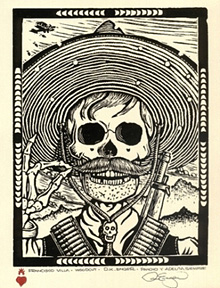 |
 |
 |
 News Around the Republic of Mexico | May 2007 News Around the Republic of Mexico | May 2007  
Drug Cartels Set Gun Sights on Mexican Army
 Laurence Iliff - Dallas Morning News Laurence Iliff - Dallas Morning News


| | Mexico's drug lords have gone on the offensive against the army, which had been put on the front lines by President Felipe Calderón to fight against the increasingly powerful and bloodthirsty cartels. |
Mexico City - After decimating police departments in drug cartel hot spots through cop killings and corruption, drug traffickers now appear to have set their sights on the powerful Mexican army, with three attacks this week against soldiers who form the last line of defense against exploding drug violence, analysts said.

In the most recent attack, late Wednesday, gunmen fired 70 bullets into the car of a navy base commander near the Zihuatanejo beach resort, leaving him unhurt but killing a marine bodyguard and injuring two others.

The traffickers' decision to take on a reasonably well-trained and well-equipped army of about 100,000 soldiers shows they are moving from defense to offense now that President Felipe Calderón has put the military at the forefront of the so-called drug war, analysts said.

"I guess we can call it a real war now," said Javier Ibarrola, a writer on military affairs. "For me there are two possible scenarios: The federal government's use of the army is working, and the [traffickers] feel cornered and forced to fight back, or it's not working and the narcos have turned their attention to the most visible force fighting them."

NEW ELITE FORCE

Earlier this week, the National Defense Ministry announced the creation of a new drug-fighting unit called the Corps of Federal Support Forces. Analysts said it appears the new unit will be an elite fighting force with special training in civilian law enforcement.

It will also become the narcos' newest target.

The slew of recent attacks by drug squads against soldiers "is sending a message: Get in our way and you're going to die," said Roderic Ai Camp, a professor of government at Claremont McKenna College in Claremont, Calif., and an expert on the Mexican military.

Calderón has said that Mexico will win the drug fight because it must, and his crackdown on traffickers has helped him earn a hefty 68 percent approval rating, according to an opinion poll last month in the Mexico City newspaper El Universal.

But there are risks for Calderón, analysts say. With its aggressive response, the military is facing accusations of human rights violations. And there is a fear that the army could eventually lose the fight or become corrupted by drug lords.

That's exactly what happened over time to Mexican police, who are both outgunned by the narcos and increasingly on their payroll, authorities say.

Should that same scenario play out over time with the army, "then you have Colombia," Camp said, referring to a country where there are shadowy alliances involving drug cartels, armed insurgents, paramilitary forces and government troops.

Mexico's left-leaning weekly magazine Proceso put in bold headlines on its cover this week: "Narco. Calderón's Iraq." Below was a picture of army helicopters sweeping into a town where five soldiers were killed in an ambush last week.

Figures from the National Defense Ministry show that the number of soldiers killed in the drug fight has been relatively steady at about 21 per year during this decade. But so far this year, 13 have been killed, including six in May.

PLENTY OF FIREPOWER

The string of attacks also suggests a tit-for-tat typical of the turf wars between drug trafficking groups, with an escalation in the level of violence, numbers killed, and the deadliness of the weapons used, analysts said. The Sinaloa and Gulf cartels are the two biggest groups.

"I doubt that the narcos are as well organized as the army, but in terms of firepower I think they are about equal," said Ibarrola. The narcos are also extremely well financed and highly motivated.

"I'm not sure how far they are willing to go" in terms of violence, he said, "but they are not willing to give up their business, period." | 
 | |
 |



